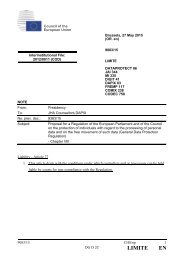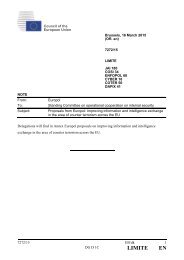National Security Information Handbook
epa-nsi-handbook-2012
epa-nsi-handbook-2012
Create successful ePaper yourself
Turn your PDF publications into a flip-book with our unique Google optimized e-Paper software.
NSI <strong>Handbook</strong><br />
<strong>Security</strong> Classification<br />
<br />
<br />
<br />
The OCA reviewing a classification challenge shall provide a written response to<br />
a challenger, via the NSI Program Team, within 60 days<br />
If the OCA is unable to complete the classification challenge review within 60<br />
days, the OCA must notify the NSI Program Team and provide a reasonable<br />
date to complete the review<br />
If the challenger is not satisfied with the decision, the challenger may request<br />
a review by an impartial official or panel assigned by the Director, SMD<br />
The NSI Program Team will inform the challenger of the OCA's expected<br />
timeframe and inform him/her that if no response from the OCA is received<br />
within 120 days, he/she has the right to forward the challenge to ISCAP for a<br />
decision<br />
The challenger may also forward the challenge to ISCAP if the NSI Program<br />
Team has not responded to an internal appeal within 90 days of receipt of the<br />
appeal<br />
Denied challenges shall include, at a minimum:<br />
A concise reason for denial of the challenge, unless such reason would reveal<br />
additional classified information<br />
The names or titles of the officials reviewing the challenge<br />
The challenger's rights to appeal<br />
The NSI Program Team shall inform the challenger of their appeal rights<br />
9. Challengers and the OCA should attempt to keep all challenges, appeals, and<br />
responses unclassified; however, classified information contained in a challenge, an<br />
agency response, or an appeal, shall be handled and protected in accordance with this<br />
handbook. <strong>Information</strong> being challenged on the basis of classification shall remain<br />
classified until a final decision is made to declassify the information.<br />
Section 3: Derivative Classification<br />
2-300 Derivative Classification Principles<br />
1. Derivative classification is reproducing, extracting, or summarizing information that<br />
is already classified. Marking the newly developed information must be consistent<br />
with the classification markings that apply to the source information.<br />
2. The duplication of existing classified information is not derivative classification, and<br />
must be treated in the same manner as the originally classified information.<br />
3. With the appropriate security clearance, EPA employees involved in the production<br />
or generation of information based on previously classified information are<br />
authorized to derivatively classify information without conferring with the OCA.<br />
4. The overall classification markings and portion markings of the source document<br />
shall supply adequate classification guidance to the derivative classifier. If portion<br />
markings or classification guidance are not found in the source document and no<br />
reference is made to an applicable classification guide, guidance should be obtained<br />
from the originator of the source document. If such markings or guidance are not<br />
2-9







